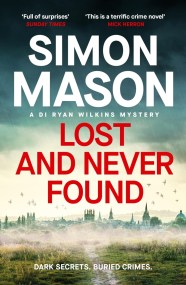SHORTLISTED FOR THE CWA GOLD DAGGER 2023
‘As great a contribution to the noble British genre of detective fiction as any writer for decades’ Stephen Fry
‘This moody, atmospheric novel is full of surprises’ Sunday Times (Crime Book of the Month)
Ryan Wilkins grew up on a trailer park, a member of what many people would call the criminal classes. As a young Detective Inspector, he’s lost none of his disgust with privileged elites. But he notices things; they stick to his eyes. His professional partner, DI Ray Wilkins, of affluent Nigerian-London heritage, is an impeccably groomed, smooth-talking graduate of Balliol College, Oxford. You wouldn’t think they would get on. They don’t.
But when a young woman is found strangled at Barnabas Hall, they’re forced to.
Rich Oxford is not Ryan’s natural habitat. St Barnabas’s irascible Provost does not appreciate his forceful line of questioning. But what was the dead woman doing in the Provost’s study?
As tensions rise, things aren’t going well. Ray is in despair. Ryan is in disciplinary measures.
A Killing in November introduces an unlikely duo from different sides of the tracks in Oxford in a deftly plotted murder story full of dangerous turns, troubled pasts and unconventional detective work.
READ THE NEXT DI RYAN WILKINS MYSTERY, THE BROKEN AFTERNOON NOW!
‘As great a contribution to the noble British genre of detective fiction as any writer for decades’ Stephen Fry
‘This moody, atmospheric novel is full of surprises’ Sunday Times (Crime Book of the Month)
Ryan Wilkins grew up on a trailer park, a member of what many people would call the criminal classes. As a young Detective Inspector, he’s lost none of his disgust with privileged elites. But he notices things; they stick to his eyes. His professional partner, DI Ray Wilkins, of affluent Nigerian-London heritage, is an impeccably groomed, smooth-talking graduate of Balliol College, Oxford. You wouldn’t think they would get on. They don’t.
But when a young woman is found strangled at Barnabas Hall, they’re forced to.
Rich Oxford is not Ryan’s natural habitat. St Barnabas’s irascible Provost does not appreciate his forceful line of questioning. But what was the dead woman doing in the Provost’s study?
As tensions rise, things aren’t going well. Ray is in despair. Ryan is in disciplinary measures.
A Killing in November introduces an unlikely duo from different sides of the tracks in Oxford in a deftly plotted murder story full of dangerous turns, troubled pasts and unconventional detective work.
READ THE NEXT DI RYAN WILKINS MYSTERY, THE BROKEN AFTERNOON NOW!
Newsletter Signup
By clicking ‘Sign Up,’ I acknowledge that I have read and agree to Hachette Book Group’s Privacy Policy and Terms of Use
Reviews
This is a terrific crime novel, with a startlingly original protagonist we're going to see a lot more of. Oxford's mean streets just got meaner.
This moody, atmospheric novel is full of surprises, with subplots about sexual harassment and the impact of the Syrian civil war.
It's a brave writer who sets a new crime series in Inspector Morse's Oxford but Mason has come up trumps with chalk-and-cheese cops DI Ryan Wilkins and DI Ray Wilkins...It's well plotted and very funny. *****
The first novel in a promising new police series set in Oxford that explores the working relationship between a chalk-and-cheese detective duo.
This has a TV series written all over it.
Simon Mason has reformulated Inspector Morse for the 2020s. This angelic two-year-old son, Ryan Jr ("Is it hard being a daddy?"), are superb and his relationship with Ray, a snob with a heart of gold beneath the sharp suit, shows huge potential. The good news is they'll be back.
The story has modern relevance, ingenious plotting, vivid characterisation, a touching father-son relationship and impressively accurate city geography.
[T]his is a very individual piece of work, with a satisfying plot involving Syrian refugees, snobbish dons and nimble interaction between the ill-assorted protagonists. There is real craftsmanship at work here.
Ryan Wilkins is about as far removed from George Smiley as a protagonist can be, he may in time become as memorable. He's an extraordinary creation, and demonstrates that even in the most suspenseful thrillers, character is king
Mason avoids the obvious tropes, and rather movingly focuses on Ryan's relationship with his young son. Well plotted, too. It's the first in a series: start now and avoid the rush.
Mason has reformulated Inspector Morse for the 2020s
Mason has reformulated Inspector Morse for the 2020s. The murder mystery is worthy of Colin Dexter but the result is less bookish and more bolshie
This moody, atmospheric novel is full of surprises.
My favourite crime novel of the year was Simon Mason's A Killing in November . . . it was enhanced by deft prose and the detective duo of social misfit Ryan Wilkins and the Balliol-educated Ray Wilkins.
Mismatched cops probe a college murder in this funny and well-plotted debut
A real page-turner . . . the relationship between the two detectives is beautifully developed, and it's brilliantly plotted and very funny
Simon Mason's Ray Wilkins crime novels are my latest addiction. I wait impatiently for each one. What are the triple pillars of any great story? Character, Plot and Language. In the twin heroes of his novels (both called Wilkins and so unalike: they somehow create together one immortal police detective) he has created characters for the ages. His plots race thrillingly around an Oxford you never knew existed. His language though ... without exhibiting a trace of "writerly" self-consciousness, he is capable of phrase-making and description of the very highest quality. Those three perfect pillars support truly memorable crime novels, as great a contribution to the noble British genre of detective fiction as any writer for decades.
My favourite UK series.




